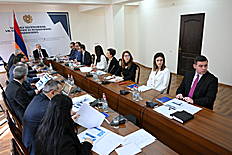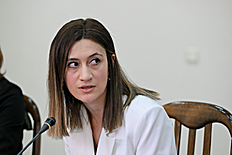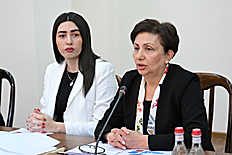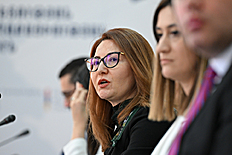Press releases
Activity report 2023 of the Migration and Citizenship Service presented to the Prime Minister
more 4 photos
Yesterday, Prime Minister Nikol Pashinyan visited the Migration and Citizenship Service of the Ministry of Internal Affairs to discuss the activity report 2023 of the latter.
Head of Migration and Citizenship Service Armen Ghazaryan and his deputies reported on the activities carried out during the reporting period.
It was reported that on December 16, 2022, the National Assembly of the Republic of Armenia adopted the legislative package on the formation of the Ministry of Internal Affairs. According to Article 2 of the Law HO-457-N "On Making Amendments and Additions to the Law on the Structure and Activity of the Government", the authority to manage migration processes has been assigned to the Ministry of Internal Affairs, and in accordance with Article 3, Part 2 of Law HO-458-N dated December 16, "On Amendments and Additions to the Law on Bodies of the State Management System", the Migration Service was renamed into the Migration and Citizenship Service.
At the same time, according to the Government's Decision of Jamuary 5, 2023 No. 17-A "On Amendments and Additions to Decision No. 580-A of the Government of the Republic of Armenia of May 22, 2018", the Migration and Citizenship Service was established as a body subordinate to the Ministry of Internal Affairs.
The goal of the structural reforms is the unified and efficient management of the migration chain, taking into account the security component of services and processes, as well as the transition from force logic to the provision of citizen-centered service.
The new structure and charter of the Migration and Citizenship Service was also approved. The structure of the service includes 6 departments and 47 territorial divisions. As a result of optimization, 63 territorial units will become 47.
It was noted that in the context of structural reforms, the aim was to turn the regional passport services into regional units of the Service, where not only passport services, but other services within the scope of the Service's functions will be provided: accepting applications for residence statuses, accepting asylum applications, accepting applications for obtaining or terminating Armenian citizenship, etc. . This approach will enable citizens and foreigners to use the services in a more flexible way and eliminate the need to come to the head office in Yerevan to submit the mentioned applications. This approach will also make it possible to get rid of heavy queues, which, although booked electronically, stretch for months.
Optimization process was based on a number of criteria: distribution of regional divisions, geography, service coverage by population, management efficiency.
Prime Minister Pashinyan referred to the optimization of regional units of the Migration and Citizenship Service according to the presented map, and noted. "This is our optimization map. Red points are optimized, blue points are preserved. This is important because there are many speculations related to this process even now. When the Meghri court was being optimized, it gave rise to political speculations, and now some of our colleagues are doing the same with Vardenis. Now I want everyone to see this map. Vayk, Ararat, Nor Hachn, that is, we carry out optimization Syunik region, Vayots Dzor region, Gegharkunik region, practically in all places, also in the city of Yerevan, and I have said, as in the case of the court in the Ministry of Justice, that our reform processes should not be affected by these speculations. We had a discussion on this topic with the Minister of Internal Affairs, and I know that there is an idea that in this optimization process and before the start of digitalization processes, if we see that there are really problematic moments, we will have mobile offices with a certain schedule in all our regions or communities. It is already a matter of organizing work so that it is accessible, but in general, our strategic vision is related to digitization. In general, why should a person stand in queue for such operations, he should be able to carry out the process from his home or workplace. And also, why are we implementing this program? This is the evidence that we first believe and are determined that we should implement digitalization. There is no way to step back, and we must go and definitely fulfill this function."
Training was carried out among the employees of the Migration and Citizenship Service for the purpose of appointment to a position. The training consisted of 2 stages: testing and oral interview. The first stage was implemented from May 22 to November 6, 2023. 505 employees participated in the training, 470 of them participated in the oral interview, 51 people did not pass the minimum threshold.
Reference was made to the digitalization process in the Migration and Citizenship Service in general. "What is our plan to get out of paper-based processes? The issue of digitization of the Migration and Citizenship Service archive is on our agenda and a program should be written. And have we already entered some kind of competition, design stage?" asked Nikol Pashinyan.
Head of the Migration and Citizenship Service Armen Ghazaryan noted that they are now working with international experts to develop a digitization program, in particular, a road map. "In other words, we are drawing now together with international experts what we have and what we will get, and we will present it to the digitization council. Partners of the International Organization for Migration are also involved in this process. Within the framework of the EU program, we have the digitization of the administrative process of citizenship."
Among the works carried out during 2023, the works of registration of persons forcibly displaced from Nagorno Karabakh, as well as the organization of the documentation process, were mentioned. Since September 19, 2023 in order to organize the registration process of people displaced from Nagorno-Karabakh, the group of the Migration and Citizenship Service conducted a site survey in Goris, registration stations connected to the State Population Register were established in Kornidzor, Goris, Vayk, Vardenis, access to the registration program was ensured in humanitarian centers, staff training and recruitment and training of volunteers was carried out.
Necessary measures are being taken to provide displaced persons from Nagorno-Karabakh with necessary documents. In particular, in order to meet the existing demand, a six-day work regime was established, and citizenship applications were accepted in all passport departments of the Republic of Armenia. At the same time, the service of displaced persons from Nagorno-Karabakh is carried out on an extraordinary basis, without the requirement of electronic queuing.
It was informed that the works aimed at digitizing the processes of granting residence statuses on other grounds, similar to the digitized process of granting residence status based on work, have been started, works have also been carried out on the analysis and improvement of the work.permit.am platform, as well as the electronic system for asylum.
In the context of legislative reforms, it was noted that in 2023, work was done on the amendment of the Law "On Refugees and Asylum", which is the legal basis for providing international protection. The bill is already ready and will be presented to the interested bodies for discussion in the near future.
During the reporting period, the reasons for the increase in the number of stateless persons were studied, as a result of which there is a need to revise the legislation in order to reduce the number of stateless persons. As a result, a bill "On Stateless Persons" was developed, which will also regulate the procedure for determining the status of the stateless persons.
In 2023, the migration.e-gov.am platform was also launched. It gives citizens the opportunity to receive a number of information online, in particular, regarding registration address, public services registration plate for both the citizen and his minor children, and identity documents.
Through the website, online queuing for service at Yerevan passport services is also carried out. According to the officials, the workload caused by queues in the regional divisions of Migration and Citizenship Service has thus decreased, the queues have been transferred to the electronic domain. In the near future, the digitized services on the migration.e-gov.am website will be expanded.
The Republic of Armenia has adopted a policy of completely switching to the biometric system of passports. It is planned to introduce a new system of biometric passports and identification cards in the form of a public-private partnership, which aims to increase the use and circulation of documents that meet secure and international standards, replace the outdated IT infrastructure, improving the security and efficiency of the process, improve the quality of service to citizens, including in terms of physical conditions of service.
In order to increase the quality of service and communication, effective quality control mechanisms are planned to be introduced. In this regard, it is also planned to create a call center, to introduce video recording equipment in all departments of the Migration and Citizenship Service.
Referring to the reforms implemented in the passport services, the Prime Minister inquired. "It was said that our task is for the citizen to have the need to visit the Migration and Citizenship Service department once every few years. Now, how are we going to accomplish this and do we already have a road map ready or not?"
Head of the Migration and Citizenship Service Armen Ghazaryan noted that their approach to the issue consists of two stages. "The first is mid-term solutions that we provide. In particular, for example, elimination of the exit stamp, certain references, if they are still needed, we are trying to make them digital so that the person does not come to us. For example, the reference of the registration, the reference of the public service registration plate, and it is very practical, there is the reference of the passport history. Some embassies require this type of reference. In the case of personal identification, a person can receive it on our platform and for that he does not need to visit the service. This is the first group, but the vast majority of our operations are passport and ID card issuance, in the sense of the front office. Here, the long-term solution is the outsourcing to the private within the framework of public-private partnership."
The issue of reforming the State Population Register was also discussed, both from the point of view of logic and ideology, as well as the structure and software. Summarizing, Prime Minister Pashinyan emphasized. "We must consolidate and manage our digitization processes in such a way that when a person performs an activity, it becomes the base data in the State Population Register that this person is currently in Armenia. That program should recognize that we gave this person a passport, but he is no longer visible, he is not on our radars. In other words, if a person entered, the digital system should give the signal that this is no longer a passport data, this is already a person's data. When any type of action related to him takes place on any digital platform, that impulse should be processed, because by doing so, after some time the database of passports will become the database of the population”.






